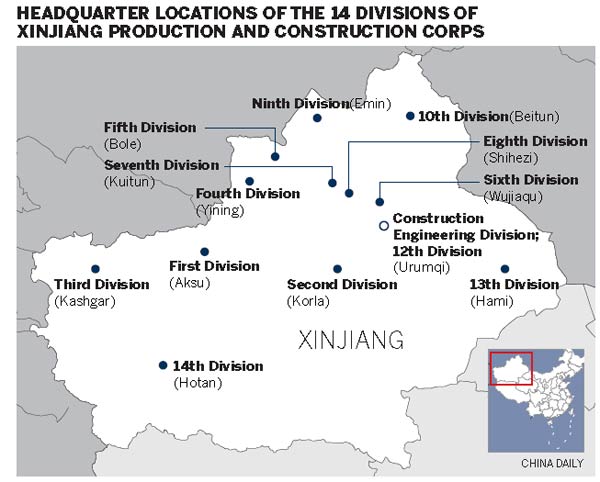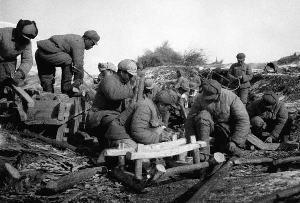From soldiers to farmers
By Cui Jia and Gao Bo (China Daily) Updated: 2014-10-15 07:16
|
 |
A special force is celebrating its achievements in the tough environment of Xinjiang, where it has built farms and homes, and maintained stability, as Cui Jia in Urumqi and Gao Bo in Shihezi report.
Zhuo Bingzhe vividly remembers how he joined the People's Liberation Army
in his hometown in Northwest China's Shanxi province 65 years ago, and moved to the Xinjiang Uygur autonomous region as a soldier. He also clearly remembers the day he was ordered to put down his gun and pick up a hoe to become a member of Xinjiang Production and Construction Corps, or XPCC, founded 60 years ago.
The 81-year-old, who still speaks with a heavy Shanxi accent, was just one of the 100,000-plus PLA soldiers who formed the Corps, which is also known as the Bingtuan. In October 1954, the central government decided to demobilize the troops in Xinjiang and set up arable and stock farms in the harsh environments of the Gobi Desert and the region's border areas.
"One day, we were told to join the Corps, and that was that. As a soldier I simply followed orders. I wasn't afraid of the harsh environment at all. The only worry I had was where I would find a wife because there were only men in the regiments and we were in the middle of nowhere," Zhuo said, with a laugh.
By the end of 2013, the Corps had 14 divisions and 176 regiments, and its 2.7 members accounted for nearly 12 percent of Xinjiang's total population.
However, Zhuo knew from day one that he wasn't just an ordinary farmer. As a member of the XPCC, he needed to be ready to be a part of a special force that would fight when the country needed them, either to defend the borders, or, more recently, to combat terrorism.
In 1962, some local residents in northern Xinjiang's Ili and Tacheng areas crossed the border illegally, leaving their homes forever. The XPCC dispatched more than 17,000 officials and workers to the areas to maintain social order and tend the farmland and livestock of those that had left. The Corps also quickly set up a belt of regimental farms along more than 2,000 km of the border area.
Threats grow
Since the 1980s, the threats to Xinjiang's social stability presented by separatism, religious extremism and terrorism have grown. To confront the threats, emergency militia battalions have been established in the Corps that can respond rapidly to terrorist activities, according to a white paper on the XPCC's history and development issued by the State Council Information Office on Oct 6.
Chen Jiazhu, the Corps' deputy commander, said: "The XPCC is not an army, but it certainly has the power to maintain social stability. Normally, everyone performs different production tasks. When we are required for missions, we must be ready. The Corps aims to become a top militia force in China and stabilize Xinjiang.
- Govt encourages people to work 4.5 days a week
- Action to be taken as HIV cases among students rise
- Debate grows over reproductive rights
- Country's first bishop ordained in 3 years
- China builds Tibetan Buddhism academy in Chengdu
- Authorities require reporting of HIV infections at schools
- Typhoon Soudelor kills 14 in East China
- Police crack down on overseas gambling site
- Debate over death penalty for child traffickers goes on
- Beijing to tighten mail security for war anniversary








